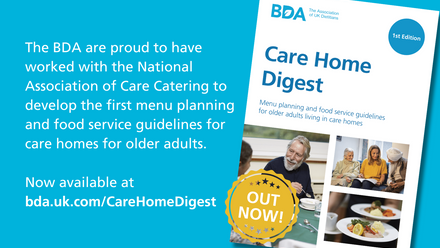Grace Falade looks at the nutritional issues around patients with dementia.
Dementia is a progressive, irreversible condition characterised by a variety of cognitive and behavioural symptoms, such as memory loss, difficulty with reasoning and communication, personality changes, and a decline in the ability to perform daily tasks.1,2 Early-onset or young-onset dementia is typically diagnosed in individuals under the age of 65.1
There are various forms of dementia, with the four primary types being Alzheimer’s disease, vascular dementia, frontotemporal dementia and dementia with Lewy bodies.3,4 Mixed dementia can also occur, where a person has more than one type, most commonly a combination of Alzheimer’s disease and vascular dementia.1,4 Individuals with mixed dementia often experience a blend of symptoms related to each type.4
Dementia places a significant burden on patients, their families and society.5 For patients, it leads to heightened anxiety, depression and dependency, while also complicating other existing health conditions. For families, it contributes to increased stress, depression and a greater caregiving responsibility.6
People with dementia often face challenges related to eating and drinking, and it is common for their appetite to change as the condition advances.4 If a person shows signs of difficulty swallowing, they should consult a speech and language therapist. Indicators of swallowing difficulties may include holding food in the mouth, continuous chewing or coughing during or after meals.4
In the early stages of dementia, individuals may struggle with shopping and storing and preparing food, may forget whether they have already eaten and may lose the cognitive ability to start or maintain effective eating habits. Dietary habits may change, leading to a reduced variety of foods and an unbalanced intake of nutrients. As the disease progresses, individuals may no longer understand what to do with the food or utensils placed in front of them, and behavioural issues arise as eating skills are lost.3,4,6 During this stage, proper nutrition is crucial to ensure a healthy, balanced diet, providing all the necessary nutrients for maintaining wellbeing.
For people with dementia, eating a nutritious, balanced diet and maintaining a healthy weight is just as important as for anyone else. Eating healthily doesn’t require avoiding or restricting specific foods; moderation and enjoying a little of what you like is key to staying fit and enjoying meals.6
Older individuals with dementia face an increased risk of malnutrition because of various nutritional challenges, raising the question of which interventions are effective in maintaining adequate nutritional intake and status throughout the disease.2,6
Weight loss is a notable clinical feature of dementia.7 Compared with those who are cognitively healthy, individuals with dementia are more likely to have a history of weight loss. This often begins in the early stages, sometimes even before diagnosis, and becomes more pronounced as the disease progresses. Preventing weight loss is vital for maintaining overall health and requires regular monitoring to detect changes early and implement appropriate interventions. Regular weight monitoring should therefore be an integral part of dementia management.6,7
Some eating and drinking difficulties associated with dementia can contribte to weight loss and malnutrition. While these issues may be directly related to dementia, underlying medical conditions could also be contributing factors, such as depression, mouth pain or dental problems, difficulty swallowing, infections, other physical illnesses or constipation, which can cause discomfort and a feeling of fullness.4
If you notice changes in the person’s appetite, or eating and drinking habits, it’s advisable to schedule a check-up with their GP or dentist to rule out any other causes. If swallowing difficulties are present, ask the GP for a referral to a speech and language therapist, who can perform a swallowing assessment to determine the appropriate fluids and diet for the patient.
Potential causes of malnutrition and dehydration in older adults with dementia may include chewing difficulties, swallowing issues, dry mouth (xerostomia), limited mobility, upper limb disabilities, psychiatric disorders, acute illnesses, medication side effects and social challenges, such as lack of support.6 Routine oral care should be provided to individuals with dementia to optimise their food and fluid intake.
Nutritional issues are a common aspect of the disease, placing individuals with dementia at a high risk of malnutrition, which is strongly linked to poor outcomes and contributes to disease progression. Additionally, malnutrition increases caregiver burden, which can further exacerbate nutritional challenges.6 Many medications can impact cognitive function, appetite and nutritional intake, so it is essential to regularly review the medications of individuals with dementia.
Patients and caregivers are often unaware of the side effects on appetite, as it typically decreases slowly and progressively, leading to more severe loss of appetite, nausea and vomiting over time.6 Even minor changes in appetite can result in significant weight loss if they occur over an extended period.

As malnutrition is common but can be effectively managed, screening should be conducted in all healthcare settings when dementia is diagnosed – whether at memory clinics, hospitals or by primary care physicians and other medical practitioners.6,8 If the MUST score is 2 or higher, a referral to a dietitian or nutritional support team should be made, or local policies should be followed, unless nutritional support is unlikely to be beneficial, such as in cases of imminent death.8
Because weight loss and nutritional issues can arise at any stage of dementia, vary between patients and differ across dementia types, regular screening is essential to identify those who may not initially be at risk, but who develop nutritional problems as the disease progresses.8
Given the high risk of malnutrition in individuals with dementia, it is particularly important to provide appealing meals and a variety of attractive foods, snacks and drinks, allowing for personal choice to support adequate food and fluid intake.6
Assisting someone with dementia in maintaining a healthy diet can be challenging, but it is essential to encourage good eating habits. Creating a pleasant, homelike atmosphere during mealtimes can help minimise distractions. Environmental factors significantly influence mealtime ambiance, including the eating location, furniture, companions, ambient sounds, odours, temperature, lighting, food accessibility, portion size and presentation.6,9
Additional ways to enhance the atmosphere include turning off the TV to reduce distractions, playing soothing, familiar music, scheduling meals to avoid times when the person may be tired or upset, ensuring the room is well lit, and using plain-coloured plates to make food more visible.4
It is crucial to avoid restrictive diets for patients with dementia, as the benefits of special diets in older adults, particularly those with dementia, are uncertain.12 Dietary restrictions can lead to malnutrition by limiting food choices and reducing the enjoyment of eating, thereby risking decreased dietary intake.6
Given the high risk and prevalence of malnutrition in individuals with dementia, along with the potentially harmful effects of dietary restrictions, ESPEN recommends avoiding such restrictions in older adults with dementia.6
Additionally, fasting periods associated with diagnostic procedures or surgeries can further compromise nutritional status and should be minimised.6 ESPEN also advises against using vitamins and minerals, such as omega-3 fatty acids, vitamins B1, B6, B12, D and E, selenium and copper, for preventing or correcting cognitive decline in the absence of deficiency indications.6
Given the high risk of malnutrition in individuals with dementia, it is essential to ensure that energy and nutrients are provided in an appealing and appetising manner to encourage intake. In addition to regular meals, snacks should be readily available and offered at various times of the day if requested, as eating patterns may shift.10
Older adults and those with dementia require more nutrients, protein and calories, which can be achieved by fortifying meals and promoting a ‘little and often’ approach with snacks and finger foods throughout the day. In cases of weight loss and reduced food intake, meals should be enriched with energy and protein, and high-energy snacks should be provided, as this has been shown to increase intake among nursing home residents, both with and without dementia.11
If a person with dementia is eating less, it’s important to encourage them to consume a nourishing diet and to fortify meals whenever possible.
Many frail older adults, including those with dementia, face challenges in lifting and handling eating and drinking utensils because of underlying issues such as muscle weakness, arthritis or tremors.6 They should therefore receive support and assistance during meals, tailored to their individual preferences and abilities, to help ensure adequate food and fluid intake.
This support can involve supervision, verbal encouragement, partial assistance with eating, or, in some cases, complete assistance, where the caregiver provides all food and fluids to the individual with dementia.
Additionally, it may include proper positioning at the table, the use of assistive tools, and help with cutting food into smaller pieces.13 In addition to providing necessary assistance for eating and drinking, a key responsibility of nursing and caregiving is to ensure the availability of food and drinks.
Individuals with dementia, especially those who are malnourished or at risk of malnutrition, require special attention and support to enhance their food and fluid intake.6,13 Many older adults, particularly those with dementia, face limitations in consuming adequate amounts of energy, protein and micronutrients because of physical, mental and behavioural changes. They should therefore be offered fortified foods and drinks to boost energy and protein intake.
As the disease progresses, the need for help with nutritional matters gradually increases,14 so it is essential to encourage adequate food intake and provide appropriate support.6
There is strong evidence that oral nutritional supplements (ONS) positively impact body weight and BMI.15 However, for ONS to be effective, it is crucial that dementia patients actually consume them, which requires close supervision and assistance from family members or caregivers. Additionally, ONS should be considered just one component of nutritional management for individuals with dementia and inadequate dietary intake.6
ESPEN also does not recommend the use of ONS, special medical foods or other nutritional products to correct cognitive impairment or prevent further cognitive decline in people with dementia. They suggest that tube feeding may be appropriate for a limited time in patients with mild or moderate dementia facing a crisis because of significantly insufficient oral intake, provided the low nutritional intake is primarily down to a potentially reversible condition.
However, they advise against initiating tube feeding in patients with severe dementia. Furthermore, ESPEN recommends against the use of artificial nutrition (enteral nutrition, parenteral nutrition and parenteral fluids) during the terminal phase of life.
References
- NICE 2021 (last revised April 2024). Available at cks.nice.org.uk/topics/dementia/references (Accessed: 6/9/24)
- Weuve J, Hebert LE, Scherr PA, Evans DA. Deaths in the United States among persons with Alzheimer’s disease (2010e2050). Alzheimers Dement 2014;10:e40e6.
- NHS (2023) What is Dementia. Available at nhs.uk/conditions/dementia/about-dementia/what-is-dementia/ (Accessed: 6/9/24)
- Dementia UK. Available at dementiauk.org/information-and-support/types-of-dementia/ (Accessed: 6/9/24)
- Van der Lee J, Bakker TJ, Duivenvoorden HJ, Droes RM. Multivariate models of subjective caregiver burden in dementia: a systematic review. Ageing Res Rev 2014;15C:76e93
- Volkert D, et al., ESPEN guidelines on nutrition in dementia, Clinical Nutrition (2015), espen.org/documents/ESPEN_GL_Dementia_ClinNutr2015.pdf
- Gillette Guyonnet S, Abellan Van Kan G, Alix E, Andrieu S, Belmin J, Berrut G, et al. IANA (International Academy on Nutrition and Aging) Expert Group: weight loss and Alzheimer’s disease. J Nutr Health Aging 2007;11:38e48
- Introducing MUST © 2024 BAPEN. Available at bapen.org.uk/must-and-self-screening/introducing-must (Accessed: 6/9/24)
- Nieuwenhuizen WF, Weenen H, Rigby P, Hetherington MM. Older adults and patients in need of nutritional support: review of current treatment options and factors influencing nutritional intake. Clin Nutr 2010;29:160e9.
- Young KWH, Greenwood CE. Shift in diurnal feeding patterns in nursing home residents with Alzheimer’s disease. J Gerontol A Biol Sci Med Sci 2001;56:M700e6
- Smoliner C, Norman K, Scheufele R, Hartig W, Pirlich M, Lochs H. Effects of food fortification on nutritional and functional status in frail elderly nursing home residents at risk of malnutrition. Nutrition 2008;24:1139e44.
- Darmon P, Kaiser MJ, Bauer JM, Sieber CC, Pichard C. Restrictive diets in the elderly: never say never again? Clin Nutr 2010;29:170e4.
- Cederholm T, Barazzoni R, Austin P, Ballmer P, Biolo G, Bischoff SC, et al. ESPEN guidelines on definitions and terminology of clinical nutrition. Clin Nutr 2017;36:49e64.
- Lin LC, Watson R, Wu SC. What is associated with low food intake in older people with dementia? J Clin Nurs 2010;19:53e9.
- de Sousa OL, Amaral TF. Three-week nutritional supplementation effect on long-term nutritional status of patients with mild Alzheimer disease. Alzheimer Dis Assoc Disord 2012;26:119e23







